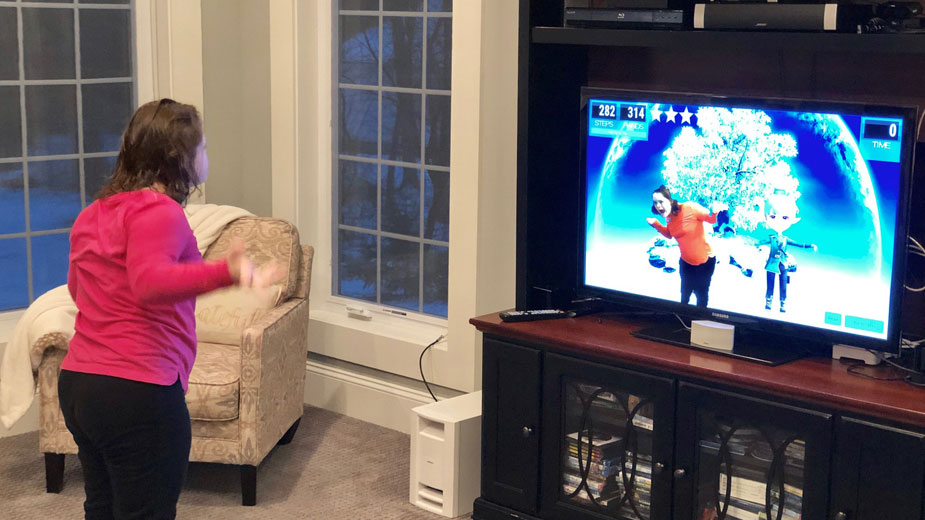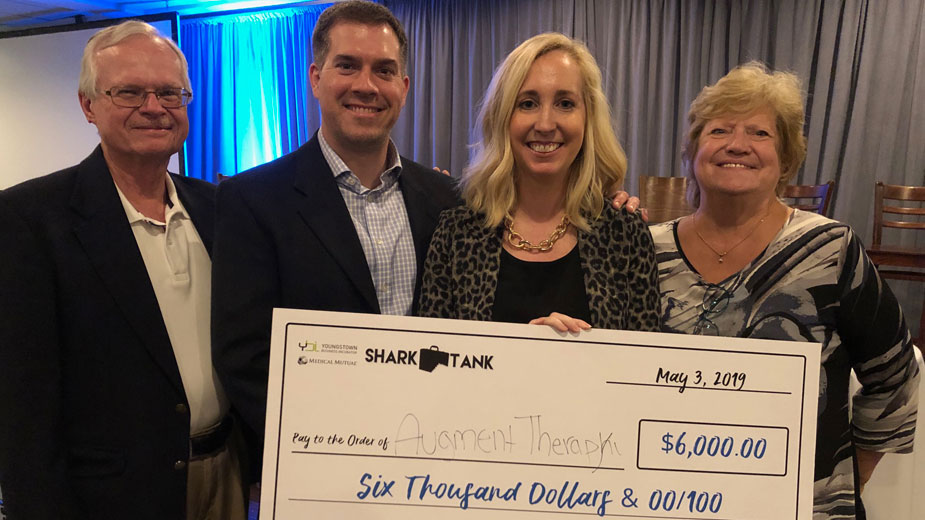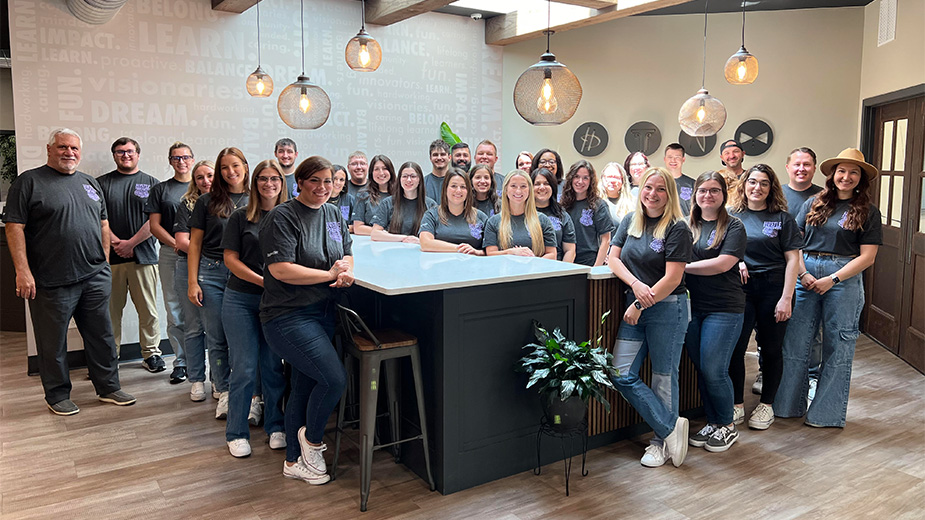$6K Shark Tank Prize Could Grow to $750K
YOUNGSTOWN, Ohio – As the finalists of the Youngstown Business Incubator’s inaugural Shark Tank event left the stage May 3, they were happy with what they walked away with: some prize money and access to the expertise of five local investors and the YBI.
But in the months since, the initial prizes – $6,000 to Augment Therapy, $3,000 to PlateMap and $1,000 to FishMySpot, all provided by the event’s sponsor, Medical Mutual of Ohio – were just the beginning for the trio of finalists.
Beyond the first-place prize money, Augment Therapy also gained $50,000 commitments from four of the five sharks at the event. Catherine Mott of BlueTree Capital Group, later upped her firm’s commitment to $150,000, becoming the lead funder.
“It was early for us, but we take a chance every once in a while when there is an obviously strong founder who appears to be well schooled in pulling a team together and getting started,” Mott says. “She had three pilots ready to pull the trigger on, so there were a lot of reasons to move forward. We’re excited about her leadership and her ability to make things happen.”
Augment Therapy is an augmented reality service for pediatric physical therapy, combining telehealth with fun activities child patients can play. For kids, it’s a fun game, but for doctors it can provide valuable information on their health and keep them engaged.
Founder and CEO Lindsay Watson says the startup has secured $375,000 as “a direct result of the Shark Tank.” Part of that number, she adds, is $100,000 from investor Vince Bacon, who attended the event and reached out to Watson afterward.

And, says YBI’s entrepreneur-in-residence, Jim Cossler, who has been advising some of the Shark Tank finalists, Augment Therapy is nearing the end of its first seed round that will bring in even more to the startup
“We’re very, very confident that with our introductions and our assistance that she will successfully close a $750,000 round,” Cossler says.
The second-place finisher, Jaynanne Sheehan of PlateMap, garnered interest from many of the sharks. Joining Mott were John Masternick, CEO of Windsor House Inc; Eugene Calabria, CEO of GBS Corp.; Ed Muransky, CEO of The Muransky Companies; and Anthony Vross, co-owner of Simon Roofing. But Sheehan has since put the development of her app, which includes a barcode scanner so shoppers can check foods for any possible allergens, on the back burner. The May 3 event was about a week before she graduated from Kent State University with a degree in computer information systems.
Afterward, she traveled internationally to learn about how allergies are dealt with in other countries before accepting a job at Eaton Corp. in Cleveland.
“PlateMap is still a business, but I haven’t made any new moves with it. That’s not to say I won’t in the future,” she says, noting that she’s willing to meet with investors. “I’m still involved in allergy groups and still in the discovery of how to help people with allergies live a better life. I’ve been struggling with having a food intolerance and there’s a stigma around that, especially with kids and bullying.”
The decision to pursue a career outside of her startup was one guided by Cossler. It’s a piece of advice he gives many young entrepreneurs, especially as they graduate college: if the right job offer comes along, take it.
“The moment I met her, I told her she has all the requisites to be a successful entrepreneur. I told her, ‘I don’t know if it’s going to be this idea or even one you haven’t thought of,’ ” he says. “She did what every graduating student does. You’ve got debt to pay off and it’s hard to devote yourself full-time to a startup that’s not producing revenue.”
Larissa Smith, the third-place finisher and founder of FishMySpot, has met with sharks but has yet to formalize an investment from any, she says. At the YBI event, she asked the sharks for a $200,000 investment, a number they decided was too high for where Smith stands in the development of her app, which is aimed at connecting anglers with the owners of privately owned ponds.
“I completely understand. That’s a big chunk of change,” Smith says. “At this point in time, they’re not investing but as we get traction and finalize updates to our online platform, I believe we’ll have another follow-up meeting with more interest.”
Over the summer, Smith hired four part-time employees and started working with the Bounce Innovation Hub in Akron to refine her marketing plan. Since many pond owners value their privacy, she says, reaching them through digital marketing methods isn’t necessarily the best way to draw them in. So, with the Akron incubator’s assistance, she’s developing a mailer campaign, initially targeting pond owners in Medina County.
“It’s one of the most populated counties in Ohio when it comes to private ponds,” she says. “Our goal for this fall is to keep growing our supply side in Ohio and as October hits, focus our efforts in Atlanta and Memphis, Tenn. We have contacts with some groups in those areas and in the southeast, you can fish all year round, so it’s a good time to get into that market.”
Like Smith, the founders of PlateMap and Augment Therapy have received help beyond the infusion of capital. Through talking with Cossler, PlateMap’s Sheehan is considering the target audience for her app, the YBI entrepreneur-in-residence says.
“It’s a great idea and there’s a verifiable market for it, but we can fine-tune it to make it more quickly accepted as a consumer product,” Cossler says, noting that some of her initial hypotheses weren’t supported by market data.
Smith and the FishMySpot team have worked with GBS’ Calabria, including a meeting that covered IT resources that the Canton-based company could offer, he says.
“[We have] an agreement in [FishMySpot] to help them better understand the amount of money they need to raise to fund the development of their system,” Calabria says. “I have the software and IT resources. She was asking far too little and we felt it would take a lot more funding to get the product where it needs to be to attract more investors.”
Calabria also connected a Shark Tank participant – he declined to say which company, but noted it was not one of the finalists – to a fund manager.
“This particular person had a good idea, but you could see they lacked the understanding of what it takes to position their company to attract investors,” he says. “That’s even more important than the funding. That initial funding will run out quick if they don’t have a well articulated proposition and development path.”
Augment Therapy, meanwhile, has had a very busy summer. The company was chosen as part of the Ignite Fire Pitch competition and was paired with Texas Children’s Hospital for a 10-week development program. The participating companies are awaiting notification of who will be chosen to pitch their ideas and products to the mentoring health-care organizations.
The startup has also submitted paperwork for a grant from the National Institutes of Health Center for Translation of Rehabilitation Engineering Advances and Technology and is approaching patient trials at University Hospitals’ Rainbow Babies & Children’s Hospital. “We’ve been working on finding other partners to pilot our solution,” Watson, the CEO, says. “We’ve been talking to KidsLink Neurobehavioral Center in Twinsburg to do some research on our solution with children with autism.”
The burst of activity from Augment Therapy, founded in 2017, following the Shark Tank event wasn’t unexpected, Blue Tree’s Mott says.
“It’s not surprising based on what we’ve seen based on her ability to execute, but it is occurring faster than some other companies we’ve worked with,” she says. “We’re thrilled with the prospect of being able to continue to invest in this company and support its growth trajectory.”
Watson also impressed her other Shark Tank investors, including Windsor House’s Masternick.
“What really struck me after their presentation, after they won, was the level of technology that we didn’t even know about from their short presentation. The technology that they have is groundbreaking. I’ve never seen anything like it,” he says.
Pictured: Augment Therapy founder Lindsay Watston, third from left, was joined by her uncle, husband and aunt when she won the Shark Tank prize.
Copyright 2024 The Business Journal, Youngstown, Ohio.


